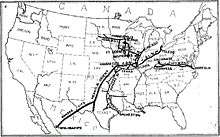Kansas City, Mexico and Orient Railway
| Locale | Mexico/United States |
|---|---|
| Dates of operation | 1900–1928 |
| Successor | Chihuahua al Pacífico/Atchison, Topeka and Santa Fe Railway |
| Track gauge | 4 ft 8 1⁄2 in (1,435 mm) |
| Length | R |


The Kansas City, Mexico and Orient Railway, started in 1900 by American railroad entrepreneur Arthur Edward Stilwell, was the predecessor to the Chihuahua al Pacífico railroad in Mexico. It was intended to reach the Pacific Ocean at Topolobampo, Sinaloa.[1]
The United States portion was incorporated in 1900 as the Kansas City, Mexico, and Orient Railway, and completed between Wichita, Kansas, and Alpine, Texas. Grading took place between El Dorado and Bazaar, Kansas. Primary shops were first located in Fairview, Oklahoma. In 1910, the Fairview shops were destroyed by fire and the shops were then re-established in Wichita. It was forced into bankruptcy in 1912, but its receiver, William T. Kemper, was to make a fortune when oil was discovered under its tracks.[2] In 1914, it was reorganized as the KCM&O Railroad. Another reorganization in 1925 returned it to its original name. It was popularly called The Orient railroad.[3]
The KCM&O was acquired by the Atchison, Topeka and Santa Fe Railway in 1928, mainly to gain access to the West Texas oil fields. The Santa Fe then sold the Mexican portions. Operating rights on the portion (South Orient Rail Line) from San Angelo to Presidio later were awarded to Texas Pacifico Transportation.
At the end of 1925, KCM&O and KCM&O of Texas together operated 738 miles of road on 859 miles of track; they reported a total of 330 million net ton-miles of revenue freight and 8 million passenger-miles.
See also
- Fort Worth and Rio Grande Railway - another attempt to build a railroad line to Topolobampbo
- List of Mexican railroads
- List of defunct Texas railroads
References